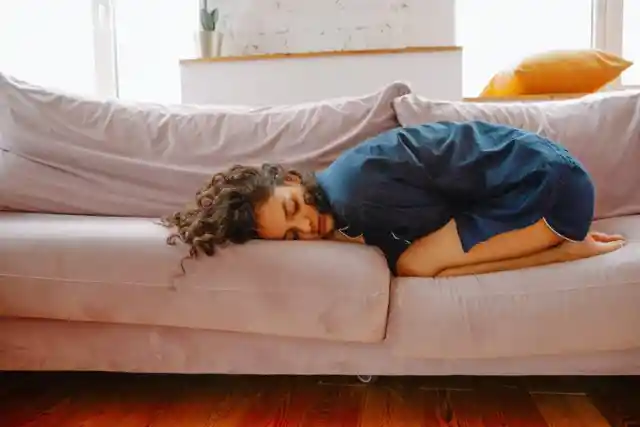Beyond the obviously uncomfortable bleeding, periods often cause a host of other undesirable symptoms. One of them is having less energy, and when combined with cramps, they may truly ruin your day. It can be tempting to curl up in bed, watch Netflix, and eat your favorite comfort food when you're experiencing period fatigue, but that's not always the greatest strategy for getting through it. Let's discuss the reasons for your low energy levels during this time of the month and how you can learn to manage it and push through.


What causes it?
Period fatigue is a part of premenstrual syndrome (PMS), which is a collection of symptoms that some people experience just before and during their period. More than 90% of those who experience periods claim to have PMS symptoms. Period fatigue may be accompanied by PMS symptoms such as headaches, sleep issues, changes in appetite, irritability, anxiety, sadness, mood fluctuations, menstrual cramps, and bloating. Though the exact cause of PMS is still up for debate, doctors agree that hormonal fluctuations are the likely culprit. Period fatigue may result from the following factors: Hormonal changes: The ovaries of a female generate the hormones estrogen and progesterone. The first half of the menstrual cycle sees a rise in estrogen production, whereas the second half sees a reduction. Serotonin levels frequently decrease in tandem with declining estrogen levels. This neurotransmitter can affect mood and energy levels when levels are low. Stress and dehydration: These are two other lifestyle variables that might contribute to period fatigue. Although these are typical reasons for fatigue and not unique to your period, staying hydrated and minimizing stress could help you feel less tired. Low levels of iron: The menstrual cycle can cause bleeding, which can lead to iron-deficiency anemia. The production of hemoglobin, an iron-rich protein needed by red blood cells to assist in transferring oxygen to the body's cells, is inhibited when the body is deficient in iron. Patients with low iron levels may experience fatigue throughout their menstruation. Period cramps: There is no denying that pain is draining. Period cramps, whether minor or severe, might make you feel more worn out than usual. You can either use ibuprofen if it works for your body or try these natural cures for period cramps. Food cravings: Periods often causes food cravings. Consuming excessive amounts of food may cause blood glucose levels to rise and then fall. This drop then causes weariness and exhaustion. Sleep disturbance: One may have trouble falling asleep or staying asleep all night if they are experiencing period cramps or mood swings. The next day, the individual can feel worn out and exhausted.How to manage period fatigue?
Make a healthy bedtime routine: This is particularly crucial in the days before your menstruation. Taking a soothing bath in the evening, avoiding screen time at least an hour before bed, going to bed at the same time every night, and avoiding heavy meals and caffeine four to six hours before bedtime is all examples of healthy bedtime rituals. Monitor your periods: Keeping track of your periods is very important. You can monitor both your cycle and your behavioral habits in this way. Numerous period tracking applications are available that can be used to mark the calendar and even take notes. Once you identify the pattern, you may adjust your diet, sleep schedule, and exercise routine accordingly to better prepare your mind for what is ahead. Eat well: Even while you might be tempted to reach for some junk food or a sweet treat, your body actually doesn't require those things. Fill up on protein-rich foods to keep you satisfied and reasonably active. Maintaining a balanced diet and abstaining from alcohol will help you stay energetic. Try to stay away from sodas and energy drinks and other foods and drinks with added sugar. Your blood sugar may surge as a result of any of these, followed by an energy slump. Exercise: Since exercise increases blood flow and endorphin levels, it actually makes you feel more energized. It doesn't have to be as demanding as your typical workouts or even close to that. Do not push yourself over your boundaries; your body needs rest, and you must pay attention to what it is telling you. Therefore, stick to low-intensity exercises. The major goal is to continue the release of happy hormones. Stay hydrated: Remember to stay hydrated by consuming at least 8 glasses of water per day. Dehydration can worsen other PMS symptoms and make you feel fatigued and lethargic. Consider birth control: If your life is significantly being affected by period fatigue, you can discuss a hormonal birth control option with your doctor. Oral contraceptives may lessen the severity of fatigue and PMS symptoms for some women. They can assist with some of the emotional symptoms of PMS as well as with heavy bleeding, which can result in an iron deficit.However, if any of the following occur, you should probably consult a physician: • No alleviation is provided by home cures. • You are unable to carry out daily tasks. • Other uncomfortable or bothersome symptoms.